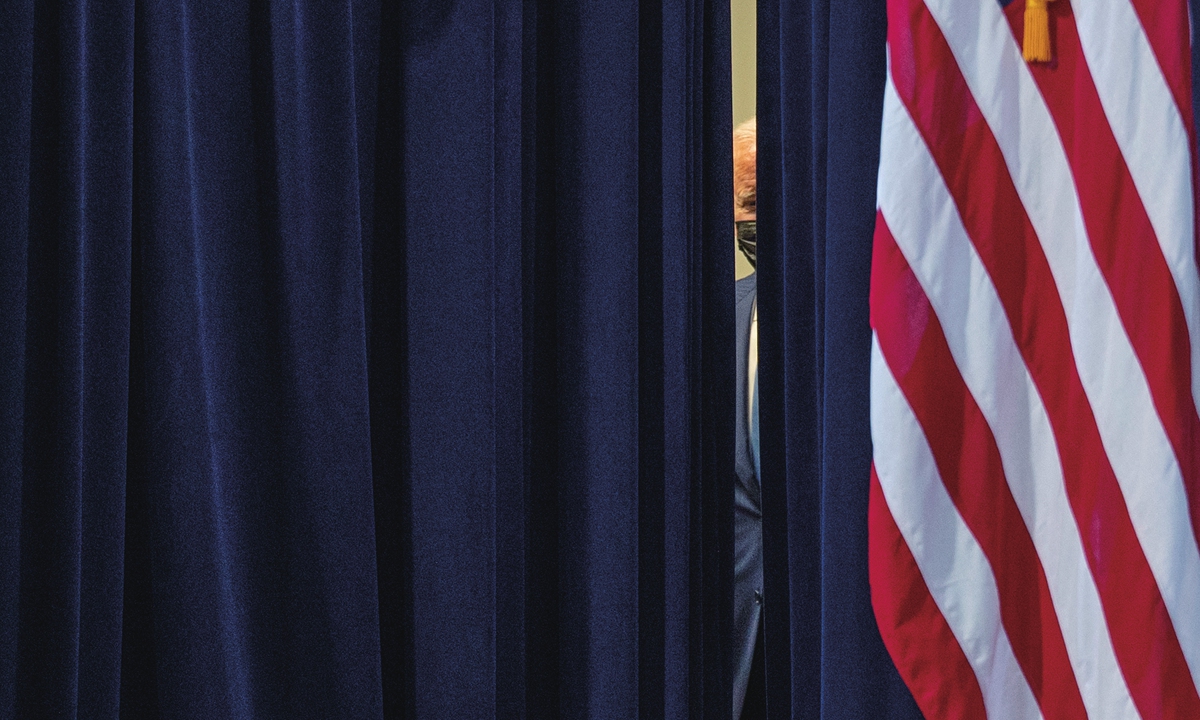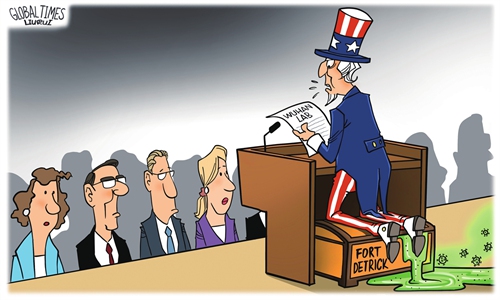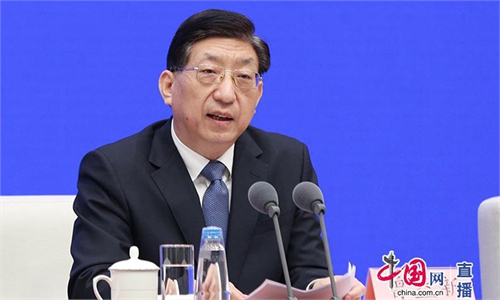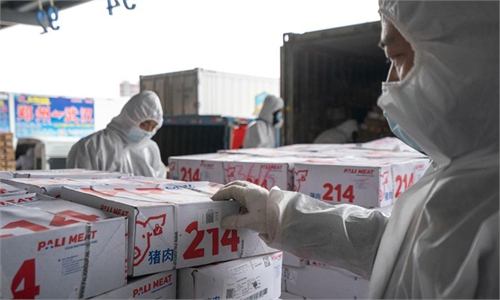US half-hearted virus report shows declining political significance of issue: scholars

US President Joe Biden is seen through a curtain as he waits backstage before coming out to deliver remarks on the COVID-19 response and the vaccination program on August 23, in Washington, DC. Photo: AFP
Editor's Note:The 90-day investigation into COVID-19 origins that US President Joe Biden has ordered the US intelligence agencies to conduct has come to a farcical end. Now that the Biden administration hasn't got its desirable results from the report, what will be its next moves to make a fuss with this issue? Why has a scientific matter become so politicized? Global Times (GT) reporters talked to Alexander V. Lomanov (Lomanov), deputy director for Primakov Institute of World Economy and International Relations, Russian Academy of Sciences (Moscow), and Yasir Habib Khan (Khan), founder and president of the Institute of International Relations and Media Research in Pakistan, on these issues.
GT: Many US media outlets revealed that the US intelligence community has failed to give a conclusive answer to where the coronavirus originated from. What do you think Washington will do next on the matter?
Lomanov: This topic will certainly continue to exist as a factor in the internal political struggle in the US. Former US president Donald Trump and the Republicans have got an opportunity to say that they would definitely find "evidence" of China's "guilt" in case they stayed at power. The politicization of the pandemic has become long-term phenomenon since the pandemic itself has become protracted worldwide. The transfer of this problem into the hands of intelligence services leads to the marginalization of the role of scientists and to the belittling of the status of scientific knowledge in global healthcare. The example of the US shows the world what should not be done in searches for origins of coronavirus. At the same time, it becomes even clearer what Russia, China and their like-minded partners should do. It is necessary to proceed from the facts and to take a rationalistic position in order to defeat the current pandemic as soon as possible and prepare for similar crises in the future. In addition, nowadays the practical urgency and importance of the issue of the effectiveness of vaccines far exceeds the problem of the origin of the virus
GT: Will the virus origins tracing become the biggest friction between China and the US in the following years to come? What are the goals that the US government hopes to achieve?
Lomanov: The half-hearted and unconvincing American report on the origins of the coronavirus suggests that over time this topic may lose its current political significance. In addition to the outright anti-China policy of the US, there is another important political factor here. Western societies are very tired of the pandemic, which has lasted for more than a year and a half. The previous hopes for herd immunity and accelerated vaccinations have not yet materialized. Politicians want to find a convenient domestic explanation for what is happening. From the point of view of internal propaganda, an unusual situation should have an unusual explanation. In other words, politicians really want to obtain an argument in order to demonstrate to their audiences that an "unusual virus" has spread in the world, and therefore it cannot be defeated by usual methods. This internal political need will decrease in the future along with the decrease in the scale of the pandemic.
GT: What do you think are the US' intentions behind its origins-tracing maneuver? Why is a scientific investigation becoming so politicized?
Khan: Every intention has its deep-rooted history that gives foundation to spillover action. The reason behind the US' intention to manipulate origin-tracing efforts is never framed on the basis of logic and rationality. Instead, it originates out of fears of losing global dominance. Though China is not the claimant of superpower, the US thinks it is under threat if China continues to spell its economic miracles with peace diplomacy, rule-based international law, equal-footed relations without any prejudice. Many in America think their lopsided world order will lose its steam soon.
Haunted by qualms, the White House has come out with full-blown "malice and malign campaign" to demonize Beijing. It is already a naked secret that even before the COVID-19 breakouts, the former Trump administration had triggered a trade war against China.
To my opinion, origins tracing is just a tip of iceberg. Roots of the US' anti-China feud were sown since the founding of the People's Republic of China in 1949.
Having leveled unfound allegations against China for stealing US intellectual property rights, the US Trade Representative prepared a report in 2017 which tried to establish that Chinese theft of American intellectual property cost between $225 billion and $600 billion annually. Former president Trump, in August 2018, signed the National Defense Authorization Act for Fiscal Year 2019 and banned Huawei and ZTE equipment from being used by the US federal government, citing security concerns. In 2019, the US Treasury designated China as a currency manipulator. In an attempt to subvert China's counter-terrorism and de-radicalizing efforts, US' bill "The Uyghur Human Rights Policy Act of 2020" was signed by Trump into law on June 17, 2020. Afflicting China's internal affairs, The Hong Kong Autonomy Act was passed by the US Congress. The US imposed sanctions and visa restrictions against several Chinese government officials on false allegations of a genocide against the Uygur population in Xinjiang and human rights abuses in Hong Kong and Tibet. The US also launched "The China Initiative" that also involved an aggressive outreach campaign, with federal prosecutors and FBI agents regularly meeting with academia and the private sector about the threat of Chinese espionage.
Above-mentioned points reveal conspicuously that origin-tracing moves are driven by ulterior agendas that lack scientific research and probing.
GT: From your perspective, what impact will the report have on China and China-US ties?
Khan: As far as the report's impact on China, it is obvious that the investigation is completed, and does not show origin-traceability. China has come clean. First, the joint WHO-China investigation did not drop a hint about China's laxity or criminal oblivion into the Wuhan lab leak propaganda. The world knows very well that the COVID-19 virus was first publicly reported in December 2019 in Wuhan, China, but that does not necessarily mean China must be the origin of the virus. As we know, the first patient of the AIDS epidemic was identified in the US in 1981, but scientists later traced the origin of HIV back to chimpanzees and simian immunodeficiency virus in Africa. On February 9 this year, the joint WHO-China investigation team held a press conference to present the preliminary findings from its 4-week field trip study. The 120-page joint research report supported the natural outbreak theory and clearly stressed it was "extremely unlikely" that the COVID-19 virus was leaked from a Chinese lab.
However, there is an opinion that conflict will not be as tense as witnessed in Trump era. Contrary to Trump, Biden desires to use anti-China outrage for political mileage.



